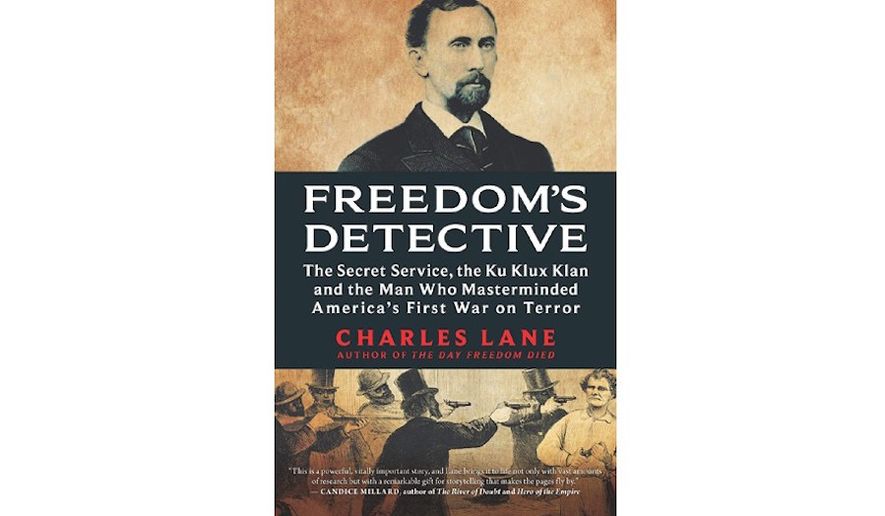OPINION:
FREEDOM’S DETECTIVE: THE SECRET SERVICE, THE KU KLUX KLAN AND THE MAN WHO MASTERMINDED AMERICA’S FIRST WAR ON TERROR
By Charles Lane
Hanover Square Press, $26.99, 352 pages
Hiram Coombs Whitley, the chief of the U.S. Secret Service under President Ulysses S. Grant, was brave and public-service-minded, yet he was also opportunistic and even, at times, criminal.
Charles Lane, a columnist for The Washington Post, offers a portrait of a man who played a major role in combating the Ku Klux Klan and major counterfeiters in the post-Civil War era. Mr. Lane’s “Freedom’s Detective: The Secret Service, the Ku Klux Klan and the Man Who Masterminded America’s First War on Terror” takes us back to a contentious time in the South after the Civil War, as well as further north to Washington, D.C., with its political battles, and to New York City with its criminal gangs.
The book deals with the post-Civil War Secret Service, before the federal law enforcement organization was a presidential protective service, and its role in combating the terror of the Ku Klux Klan.
Mr. Lane tells us that Whitley left his home on the Ohio frontier while still a teenager, and he worked on fishing boats out of Gloucester, Massachusetts; slung hash at a makeshift Kansas restaurant; traded sugar and molasses on the Red River of Louisiana; and served as a Union Army officer in New Orleans during the Civil War, and later served as a federal law officer.
“Through these experiences, Whitley had formed an appreciation for the American wilderness and the physical challenges it presented. He had grown from a skinny, bowlegged kid into a sinewy thirty-seven-year-old man, with piercing blue eyes, high cheekbones, and a vaguely menacing dark brown goatee,” Mr. Lane writes. “He had developed the skills with horses and firearms that helped make him useful to the government; he arrived at the Staunton River not only as a representative of the Treasury Department, but also as a deputy United States Marshal, carrying a sheaf of blank warrants authorizing him to arrest any violator of the tax law he might encounter. More than that, he had developed a thoroughly jaded view of human nature, and how it could be manipulated to his advantage, honestly, if possible — but through deception if necessary, and convenient.”
Mr. Lane describes the turmoil in Southern states after the Civil War, the politics and effects of Reconstruction, and the hostile views of most white Southerners toward the newly freed African Americans. He also offers a history of the early Ku Klux Klan, and how a former Confederate cavalry officer named Nathan Bedford Forrest took over the Klan and converted its sporadic violence into an organized terror campaign.
The Ku Klux Klan was little known in the North prior to the Klan’s murder of a white Republican politician in Tennessee. In response to the murder, the U.S. Army’s Capt. William Mills had federal legal authority under the Reconstruction Acts, but he knew he did not have the investigative skills to discover the murderers.
“I desire to have sent to me, without delay, an experienced detective to aid in detecting the Ashburn murderers,” Capt. Mills telegraphed Gen. Grant. “Can such a person be sent?”
A War Department investigator was sent, but he was unsuccessful. He in turn asked for a detective who had a reputation as a master infiltrator and interrogator — Hiram Whitley.
The murder investigation began Whitley’s battle with the Ku Klux Klan.
The federal detective was successful in his investigation of the murderers, but his methods, such as pointing a cannon at a reluctant African American witness, came into question.
When Grant became president, counterfeiters flooded the nation with fake bills, many made in Canada and smuggled South. Hiram Whitley, with his record of battling moonshiners and the Ku Klux Klan, became the chief of the Secret Service and took on the counterfeiters.
Mr. Lane describes the Secret Services’ investigations of major counterfeiters, as well as the Ku Klux Klan. Whitley assigned his detectives to assume fictitious identities and infiltrate both counterfeiting gangs and the Klan, often with success. He was granted extraordinary powers and autonomy, and he made great strides against criminals, but not all were happy with his semi-clandestine national police force and his questionable investigative methods.
Taking on the Klan did not make Whitley popular with Southern politicians and when the Secret Service chief concocted a phony safe burglary of a presidential adviser, planning to blame the crime on a critic of the Grant administration, the plan went wrong. The Southern politicians called for his removal as Secret Service chief and for his prosecution.
“Freedom’s Detective” is an interesting and well-researched book about an interesting and flawed man who led the early Secret Service and fought the Ku Klux Klan.
• Paul Davis covers crime, espionage and terrorism.




Please read our comment policy before commenting.